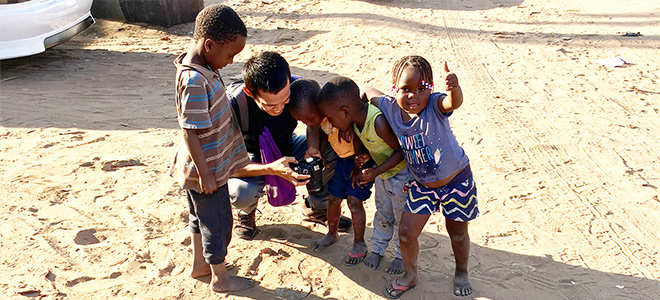
Red Cross/Red Crescent Climate Centre Internship Program
by Juhri Selamet
Maputo, Mozambique
June 14, 2018
 Juhri Selamet is the 2018 Junior Researcher in the Red Cross Red Crescent Climate Centre (RCRCCC) program. He is a PhD student in the College of Media, Communication and Information at University of Colorado Boulder. He has a bachelor’s degree from Bandung Institute of Technology, Indonesia and a master’s degree from the University of Illinois at Chicago. His research interests are visual communication, corporate social responsibility, climate change, water, conservation, media coverage of risk and the environment, and strategic environmental communication.
Juhri Selamet is the 2018 Junior Researcher in the Red Cross Red Crescent Climate Centre (RCRCCC) program. He is a PhD student in the College of Media, Communication and Information at University of Colorado Boulder. He has a bachelor’s degree from Bandung Institute of Technology, Indonesia and a master’s degree from the University of Illinois at Chicago. His research interests are visual communication, corporate social responsibility, climate change, water, conservation, media coverage of risk and the environment, and strategic environmental communication.
View photo gallery in the field by Juhri Selamet
I am still learning how to implement the Red Cross and IFRC Community Engagement and Accountability toolkit. This toolkit contains tools that can help the National Red Cross and the Red Crescent Societies to assess, design, monitor, and evaluate community engagement and accountability activities in support of programs and operations. So, based on this comprehensive toolkit, I will try to transform it to fit the local context. My first exploration is designing a Forecast-based Financing (FbF) policy overview here in Mozambique.
The policy overview of Forecast-based Financing is a brief presentation to governments, donors, and implementing organizations on the current state of knowledge and practices in Forecast-based Financing, its relation with the broader Early Warning Early Action (EWEA) agenda, and its contribution to the global humanitarian policy landscape. The policy overview of FbF presents vital lessons from ongoing pilot projects and a vision of the anticipated agenda. As can be seen from the past decade, the Early Warning Early Action agenda has spurred investments in climate services, forecast information, and communication protocols worldwide.

The draft of the design adaptation that we have developed from the original FbF policy is in English, with Janio and Samuel translating it into Portuguese. There are many things to consider for the development of the design. We hope this FbF policy document will inform the local audience in Mozambique about the project in general. Details like images become essential. While we want to show and communicate our activities through pictures, we also acknowledge that images could be a barrier or hard to print in our local office with our current resources. Aside from this policy design, I will also start to explore and create other communication materials (e.g., Early Warning Protocol Guide template, Brochure, etc.) that could be useful for communicating the FbF project.

Outside of Cruz Vermelha De Moçambique’s (CVM’s) office, I keep exploring Maputo in my free time. It is the winter season right now in Mozambique. We experience about 24–27 degrees Celsius during the day and 14–19 degrees Celsius at night. Janio told me that the winter season will last until November. I enjoy this weather. To me, it is perfect: not too hot, not too cold.
I went to Mafalala last Sunday. Mafalala is one of the bairros in Maputo. Benjamin walked with me to this area, sharing the stories about the rich historical and cultural roots of Mafalala. He told me that Mafalala is famous for Marrabenta, a typical Mozambican style of music and dance, which was coined here and blends traditional Mozambican rhythms and Portuguese folk music with influences from popular Western music. I was excited to see the traditional dance performance; unfortunately, we missed it. However, I had a chance to visit Mafalala’s elementary school and watch a women’s football match, since Mafalala is also famous for football. This is because this bairro is the birthplace of Eusébio de Silva Ferreira, who is considered (by me) to be one of the best soccer players of all time. Read more …


RC/RCCC Notes From the Field: Learning Experience From a Policy to a Bairro
Red Cross/Red Crescent Climate Centre Internship Program
by Juhri Selamet
Maputo, Mozambique
June 14, 2018
View photo gallery in the field by Juhri Selamet
I am still learning how to implement the Red Cross and IFRC Community Engagement and Accountability toolkit. This toolkit contains tools that can help the National Red Cross and the Red Crescent Societies to assess, design, monitor, and evaluate community engagement and accountability activities in support of programs and operations. So, based on this comprehensive toolkit, I will try to transform it to fit the local context. My first exploration is designing a Forecast-based Financing (FbF) policy overview here in Mozambique.
The policy overview of Forecast-based Financing is a brief presentation to governments, donors, and implementing organizations on the current state of knowledge and practices in Forecast-based Financing, its relation with the broader Early Warning Early Action (EWEA) agenda, and its contribution to the global humanitarian policy landscape. The policy overview of FbF presents vital lessons from ongoing pilot projects and a vision of the anticipated agenda. As can be seen from the past decade, the Early Warning Early Action agenda has spurred investments in climate services, forecast information, and communication protocols worldwide.
The draft of the design adaptation that we have developed from the original FbF policy is in English, with Janio and Samuel translating it into Portuguese. There are many things to consider for the development of the design. We hope this FbF policy document will inform the local audience in Mozambique about the project in general. Details like images become essential. While we want to show and communicate our activities through pictures, we also acknowledge that images could be a barrier or hard to print in our local office with our current resources. Aside from this policy design, I will also start to explore and create other communication materials (e.g., Early Warning Protocol Guide template, Brochure, etc.) that could be useful for communicating the FbF project.
Outside of Cruz Vermelha De Moçambique’s (CVM’s) office, I keep exploring Maputo in my free time. It is the winter season right now in Mozambique. We experience about 24–27 degrees Celsius during the day and 14–19 degrees Celsius at night. Janio told me that the winter season will last until November. I enjoy this weather. To me, it is perfect: not too hot, not too cold.
I went to Mafalala last Sunday. Mafalala is one of the bairros in Maputo. Benjamin walked with me to this area, sharing the stories about the rich historical and cultural roots of Mafalala. He told me that Mafalala is famous for Marrabenta, a typical Mozambican style of music and dance, which was coined here and blends traditional Mozambican rhythms and Portuguese folk music with influences from popular Western music. I was excited to see the traditional dance performance; unfortunately, we missed it. However, I had a chance to visit Mafalala’s elementary school and watch a women’s football match, since Mafalala is also famous for football. This is because this bairro is the birthplace of Eusébio de Silva Ferreira, who is considered (by me) to be one of the best soccer players of all time. Read more …